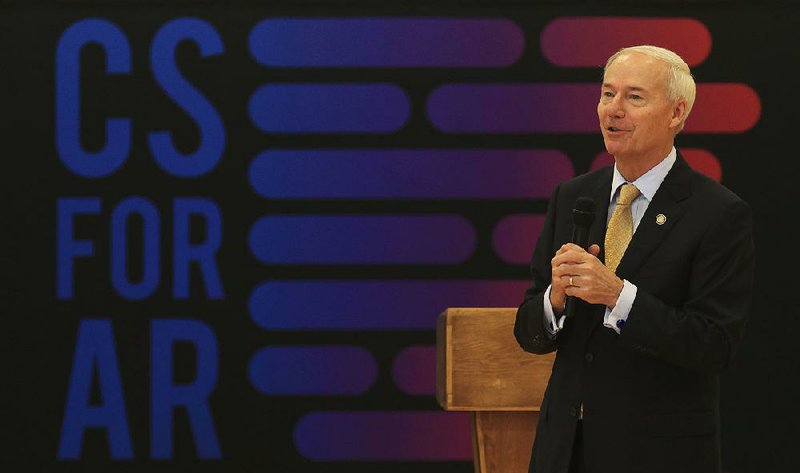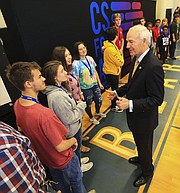LONOKE -- Gov. Asa Hutchinson's face lit up Thursday as a Lonoke High School senior in the Jackrabbits' gym posed a question about gender inequality.
Why are women a minority in the field of computer science? And is there value to bringing some gender parity to the technology sector, she asked.
The Republican governor, alone in the center of the gymnasium with students filling the bleachers on either side, lowered the microphone, took a step back and smiled.
The question impressed him, and he had an answer. His administration has focused on shrinking the gender gap in high school computer classes.
Still smiling, Hutchinson raised the microphone to tell the students that best results come when various perspectives are considered.
"Coders shape the future," he said. "I don't think anyone wants the future to be shaped by only guys."
It's brief interactions like these that have evolved over the past four years, Hutchinson said in an interview after the assembly at Lonoke High School -- the sixth stop on Hutchinson's ninth computer science education tour across Arkansas.
Hutchinson began visiting schools to promote computer science during his first year in office -- 2015. Increasing enrollment in coding classes has been a main focus, from his 2014 campaign through the first five years in the Governor's Mansion.
Enrollment in such courses increased sharply after the General Assembly in 2015 passed Hutchinson's initiative to require that all public schools in Arkansas offer at least one "high-level" computer-science class.
When Hutchinson signed that law, 1,104 students in Arkansas were taking computer classes. Last school year, 8,044 students were enrolled, out of nearly 144,000 students in public schools.
The administration believes that a background in computer science will prepare students for a variety of life experiences, whether they go to college or immediately to work; furthermore, companies with a need for tech-savvy workers will be more likely to move to Arkansas, driving economic development.
On his first tour, Hutchinson said computer science was a "hard sell."
"It was like I was a person from Mars," Hutchinson said. "They weren't into it. They didn't really understand the importance of it. I was really swimming upstream."
That's changed, Hutchinson said, now that computer-science curriculum has been worked into lower grades and more schools have embraced it.
John Tackett, superintendent of the Lonoke School District, said that computer classes at the central Arkansas high school have encouraged students to "step outside the box" and improved problem-solving. The governor's visit, he expects, will be a shot in the arm for encouraging students to go beyond the core classes.
The computer-science push also coincides with a paradigm shift in secondary education, Tackett said. Schools aren't strictly pushing students to college; they're preparing some to go directly into the workforce.
Computer science is a large part of that, Tackett said, pointing to the technology used in some of Lonoke's largest industries: row crops and aquaculture.
High school students today are thinking ahead to the workforce in a way that they weren't just a decade ago.
"And why would they have been?" Tackett said. "We never told them to. Kids become interested when you tell them, 'Let's build you a portfolio.'"
Coding classes, Hutchinson and Tackett agree, would be beneficial for every student to take because they teach skills that have such wide application. However, Hutchinson has resisted calling for those classes to be made a graduation requirement, as has been done in West Virginia.
Instead, he said, student demand should drive course offerings. One factor that drives student computer-science enrollment, Hutchinson said, is having an actual teacher on campus. While all schools must offer computer courses, they can opt to offer them online.
Of the 8,044 students enrolled in computer classes, about 1,000 take them online, said Anthony Owen, state director of computer-science education.
To attract more teachers, Hutchinson recently announced the expansion of a teacher stipend program. The Arkansas Department of Education offers high school teachers a one-time, $2,000 stipend to obtain certification to teach computer science.
Details are still being finalized, but the expanded program will offer those teachers up to $10,000 over five years to obtain the certification and expand upon it in subsequent years.
There's even money available for students. The students at Lonoke on Thursday let out a collective gasp when Hutchinson told the senior girl who asked him about gender inequality that she could receive up to $1,000 in cash if she scores well on the Advanced Placement computer-science exam later this year.
The state Education Department awarded $120,500 to Advanced Placement computer-science students last year. Those who score a 5, the highest possible mark, receive $1,000; those who get a 4 receive $750; and $250 is available for scores of 3.
After speaking and taking students' questions Thursday, Hutchinson mingled with Lonoke's coding students. Several one-armed robots, resembling an Erector set, scurried around their feet, picking up Mountain Dew cans and stacking them.
The school's computer teacher, Alex Moeller, looked on happily. He started his career in the private sector, and he went to Lonoke High School to work in a classified position. He got certified to teach computer science as the program began to take off across the state.
Every student stands to benefit from taking computer science, he said, noting that the subject at its core is simply solving problems.
He said that since becoming a computer teacher, several private companies have approached him about jobs in the technology field, but he has turned them down despite higher pay, much to the confusion of his students.
"They don't understand it yet," Moeller said. "Sometimes it's not about what you make; it's about the difference you make."
Owen, the state computer-science director, said the initiative is still in its infancy, so the effect it has on the state's workforce and economy are still difficult to gauge. However, he suspects in the coming years that Arkansas will see an increased number of tech industry certifications and higher enrollment in college level computer-science classes.
As Hutchinson completes this year's school tour, he said that momentum continues to build, and he continues to hear stories that affirm his commitment to computer education.
He told the Lonoke students that he became deeply interested in coding while serving as an undersecretary at the Department of Homeland Security under President George W. Bush after the terrorist attacks on the United States in 2001. There, he watched cybersecurity experts used complex software to keep Americans safe.
He encouraged students even in rural areas like Lonoke to consider pursuing computer science.
"If you know coding and you have access to [the] Internet, you can run the world from your front porch," he said.
SundayMonday on 09/15/2019

